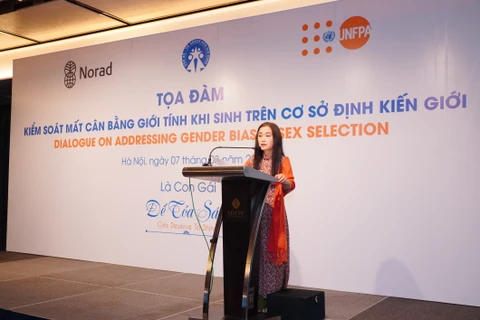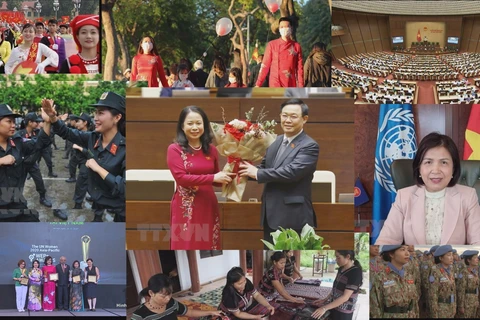Hanoi (VNA) – The northern part of Vietnam features an array of colourful rustic hamlets surrounded by rugged mountains and towering terraced rice fields, the emerald stairways that reach the heavens above.
Built on brilliant green terraces with five bungalows, Goong House in Ta Van village, Sa Pa resort town, is an ideal homestay for visitors to enjoy the stunning landscapes and discover some of the planet’s most treasured tourist spots.
Its owner, Chao Thi Yen is busy welcoming back tourists post-pandemic. The young Dao Tuyen ethnic girl said her homestay has become more crowded with customers these days, creating jobs for dozens of locals.
“I know that had it not been for the access to the education I took advantage of, I could never have reached her dream of a sound homestay business like this,” said the proud young entrepreneur.
Ethnic girls dream big
Born into a large family in the border village of Ngam Xa, Nam Chac commune, the northern border province of Lao Cai, where access to education is often restricted – even just because they are girls, Yen had to struggle hard for her education.
Memories of her difficult time “against the odds” flooded back when Yen looked at the snaking road that leads to the Goong House. She said her path to studying was rocky just like the one before her.
Years ago, like many other tribes in the province, Dao Tuyen ethnics did not let their kids go to school because they were poor. Kids stayed at home to help parents with the farming on terraced rice fields or steep hillside cassava plots, many becoming the breadwinners of the family.
“We lived in hunger for years. I gradually came to know that only through education could I have a chance to taste dried fish and tofu with tomato sauce – a luxurious dish for us at the time,” said Yen, tears rolling down her cheeks.
 The young Dao Tuyen ethnic wins a full scholarship worth 50,000 USD from the Eramus Mundus programme. (Photo courtesy of Yen)
The young Dao Tuyen ethnic wins a full scholarship worth 50,000 USD from the Eramus Mundus programme. (Photo courtesy of Yen) “Not until my teacher told me that I had to go to school to escape poverty did I realise how important education was. He was the one that came to my house to persuade my parents to let me go to school again after I had dropped out for three years.”
Not only a high school certificate and then a bachelor degree, Yen’s eagerness to get out of poverty motivated her to pursue a master’s degree in sustainable forest and nature management in Germany and Italy.
She won a full scholarship worth 50,000 USD from the Eramus Mundus programme two years after graduating from the Vietnam National University of Forestry, becoming the first girl from an impoverished ethnic hamlet where the cycle of poverty and early marriage has lingered on for generations to study abroad.
Yen’s success story has surprised many others who once discriminated against her family just because she was allowed to go to school.
Yen said besides her own efforts, in her path to higher education, she received support from donors, teachers and friends without which she could have never completed her odyssey.
Like Yen, little girl Tan Thi Shu from a poor Mong family in Sa Pa town rose out of poverty thanks to her efforts for education in realising her big dreams.
Having no opportunity to attend school because her family was simply unable to afford it, let alone a meal a day, Shu followed her friends to sell brocade products to tourists in Sa Pa at the age of 12. She still remembered how sad she felt when a group of children visiting the town looked down on her, howling with laughter at her appearance.
Shu kept asking herself why those kids made fun of her, why she could not go to school, and why her life was so difficult. However, she told herself that she must break the cycle and then decided to try to learn English by talking with foreign tourists. Shu also worked hard at local restaurants before gaining considerable experience to set up her own travel firm called Sapa O’Chau. More than just earning money, with the business, Shu wants to create jobs and study opportunities for ethnic kids in her hometown.
Six years ago, Shu was named one of the 30 most influential under 30 by Forbes Vietnam. Her Sapa O’Chau also obtained international accreditation from World Responsible Tourism Awards 2016 and World Tourism for Tomorrow Awards 2016.
Equality in education access for ethnic minority women, girls
Vietnam has gained huge achievements in promoting gender equality and ensuring the rights of ethnic minority women and girls which win extensive praises.
A national legal framework has been developed for gender equality and women's empowerment, including policies to promote that in ethnic minority-inhabited areas. The Law on Gender Equality (2006), the National Strategy on Gender Equality for 2011-2020, and the national programmes on gender equality for 2011-2015 and 2016-2020 all contain provisions to promote gender equality among the ethnic minority groups.
Figures from a survey on socio-economic status of 56,400 villages of ethnic minorities across the nation conducted by the General Statistics Office and the Government’s Committee for Ethnic Minority Affairs in 2019 show that the proportion of out-of-school ethnic minority children is brought down to 15.5% in 2019, nearly half from the 26.4% in 2009. Meanwhile, the rate of ethnic minority people aged 15 and over who know how to read and write is pulled up to 80.9%, up 1.7 percentage points compared with 2015.
In ethnic minority areas, the percentage of girls attending school still remains low. The proportion of primary and secondary age out-of-school girls is much higher than boys.
 Pupils in a class at Nam Ty primary school, Hoang Su Phi district, the northern mountainous province of Ha Giang (Photo: VNA)
Pupils in a class at Nam Ty primary school, Hoang Su Phi district, the northern mountainous province of Ha Giang (Photo: VNA) It is for the reason that raising awareness about gender equality and eliminating gender stereotypes is seen as one of the factors determining whether education policies can be successfully implemented in ethnic minority-inhabited areas.
As part of the solution, specific policies have been issued for those areas such as the project on minimising child and consanguine marriage among ethnic minorities in the 2015-2025 period. The project on gender equality support activities in ethnic minority areas for 2018-2025 has also started, as has the Master Plan for Socio-Economic Development in Ethnic Minorities and Mountainous Areas in the 2021-2030 period.
Gender equality and the empowerment of women are essential for Vietnam in its path to realise sustainable development goals (SDGs) of the UN, according to the UN Development Programme (UNDP) in Vietnam.
Elisa Fernandez Saenz, Country Representative of the UN Entity for Gender Equality and the Empowerment of Women (UN Women) in Vietnam, underlined the need to ensure educational opportunities for ethnic minority children and to have solutions to urgent issues that women of ethnic minorities face.
She said that Vietnam should also further efforts to swiftly remove existing barriers towards fulfilling the country’s gender equality-related targets. This includes SDG5 which aims to eliminate all forms of gender discrimination against women and girls across public and private spheres, including education.
Poverty, gender stereotypes and social norms restrict women’s advancement. They are also the main barriers against the development and implementation of educational policies, especially in ethnic minority areas where gender discrimination still persists in parental attitudes.
Poverty was once a torment for Yen and Shu. Although the two are no longer impoverished, they are still working hard to help ethnic minorities have stable livelihoods so as to prevent dropouts among ethnic children, especially girls.
“Successful study means I will never be poor again. Helping ethnic minority groups get out of lingering poverty is what I am trying. I hope that no girls will have to drop out of school because of poverty like me years ago,” Yen said.
In her time with the not-for-profit People and Nature Reconciliation (PanNature), Yen travelled to mountainous highlands to raise locals’ awareness of the harms of deforestation, while helping them develop sustainable livelihoods.
In the meantime, she set up an “against the odds” bookcase fund to inspire the learning spirit among ethnic children in her hometown.
 With the “against the odds” bookcase fund, Yen hopes to inspire learning spirit among ethnic children in her hometown. (Photo courtesy of Yen)
With the “against the odds” bookcase fund, Yen hopes to inspire learning spirit among ethnic children in her hometown. (Photo courtesy of Yen) According to Yen, now that life in Ngam Xa is much better, ethnic kids, especially girls, have more opportunities to access education.
“Thanks to the development in telecommunications infrastructure, my villagers, though deep in the valley, now know more about the outside world. They are aware of the importance of education as well as the Party and State’s policies to ensure school attendance for ethnic children,” Yen said./.






















